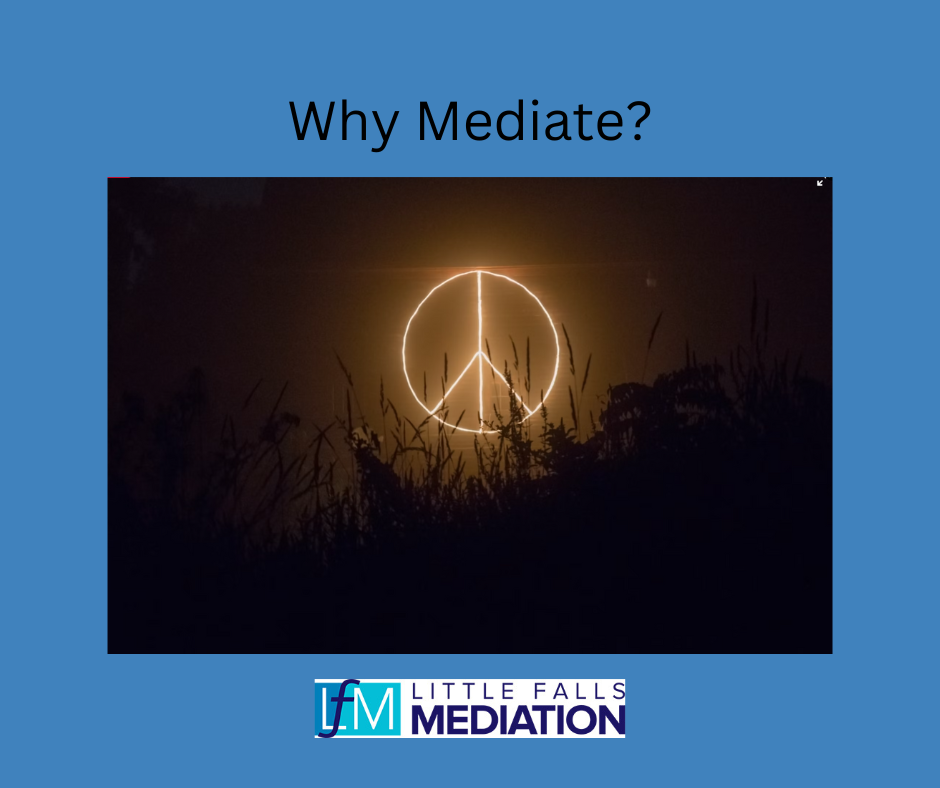 Should we mediate? I often am asked this question when I pick up the phone and speak to a prospective client. I always answer by saying that Little Falls Mediation is 100% devoted to mediation, which is one form of alternative dispute resolution. I do not litigate. Mediation fosters communication, understanding, and collaborative problem-solving, and it offers many benefits that transforms the way conflicts are resolved. Here are just some of the benefits of mediation: 1. Preserving Relationships. One benefit of mediation is the focus on preserving relationships. Unlike an adversarial approach such as litigation, where parties are pitted against each other, mediation provides a supportive and non-confrontational environment. By promoting open dialogue, active listening, and empathy, mediation helps to build understanding and empathy between parties. This cooperative atmosphere enhances the possibility of maintaining long-term relationships. 2. Empowering the Parties. Mediation empowers the parties involved by giving them control over the dispute resolution process and the outcome. Unlike traditional dispute resolution methods where decisions are imposed by judges or arbitrators, mediation allows individuals to actively participate in shaping their own outcomes. The mediator acts as a neutral facilitator, guiding the conversation and assisting parties in finding mutually agreeable solutions. By giving participants a voice, mediation promotes a sense of ownership, satisfaction, and empowerment, leading to more durable and sustainable resolutions. I always tell my clients that they are the experts on their particular situation or dispute. 3. Cost-Effective Solution. In today's complex legal systems, litigation can be a lengthy and costly process. It is not uncommon for one party to pay $100,000 to his or her divorce attorney. Mediation, on the other hand, offers a cost-effective alternative. By avoiding court fees, attorney fees, and prolonged proceedings, mediation significantly reduces the financial burden associated with conflict resolution. Additionally, mediation saves valuable time by streamlining the process, allowing parties to focus on finding practical solutions rather than engaging in lengthy legal battles. This affordability and efficiency make mediation an attractive option for individuals, businesses, and organizations seeking prompt and budget-friendly resolutions. 4. Confidentiality and Privacy. Confidentiality is a critical aspect of mediation. Mediation sessions are private and confidential, ensuring that sensitive information and discussions remain protected. Parties can openly express their emotions, concerns, fears, and aspirations without the fear of public exposure or legal repercussions. This confidentiality fosters an environment of trust and openness, facilitating more honest and productive dialogue between the parties. The privacy aspect of mediation can be particularly beneficial for resolving personal, family, or business disputes where preserving reputation and maintaining confidentiality are of utmost importance. 5. Creative and Tailored Solutions. Mediation encourages creative problem-solving by allowing parties to explore a wide range of possibilities. Unlike court-imposed decisions, mediation enables parties to devise unique and tailored solutions that suit their specific needs and interests. This flexibility allows for more innovative and mutually satisfying outcomes. By brainstorming and evaluating various options, parties can reach resolutions that may not have been possible through traditional legal processes. This collaborative approach encourages win-win scenarios, where both parties feel that their concerns have been addressed. Mediation offers numerous benefits that go beyond traditional adversarial approaches. By fostering collaboration, preserving relationships, empowering the parties, and providing cost-effective and confidential solutions, mediation transforms the way conflicts are resolved. Its emphasis on creative problem-solving and tailored outcomes ensures that the parties, and not a judge or an arbitrator, control the decision-making process.
1 Comment
|
AuthorEllice Halpern, J.D., is a Virginia Supreme Court certified general and family mediator. Archives
June 2024
Categories |
Copyright © 2015 www.littlefallsmediation.com

 RSS Feed
RSS Feed